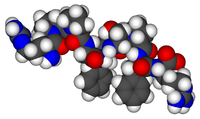
Photo from wikipedia
Cisplatin‐based chemotherapy is a widely used chemotherapeutic regimen for gastric cancer; however, drug resistance limits its efficacy. [6]‐Gingerol has been found to exhibit anticancer effects. Here, we aim to explore… Click to show full abstract
Cisplatin‐based chemotherapy is a widely used chemotherapeutic regimen for gastric cancer; however, drug resistance limits its efficacy. [6]‐Gingerol has been found to exhibit anticancer effects. Here, we aim to explore the potential of [6]‐gingerol in combination with cisplatin as a new regimen for gastric cancer. CCK‐8 assay and colony formation assay were used to determine the effect of [6]‐gingerol in combination with cisplatin on cell viability of gastric cancer cells. Flow cytometry was performed to assess cell cycle distribution. Wound‐healing assay and transwell invasion assay were conducted to examine the migration and invasion abilities. Cell cycle and invasion‐related proteins and mRNAs, as well as PI3K/AKT signaling proteins, were assessed by western blotting and quantitative real‐time polymerase chain reaction. Combination of [6]‐gingerol with cisplatin inhibited cell viability and enhanced cell cycle arrest at G1 phase compared with cisplatin alone. The combination treatment inhibited cell migration and invasion ability and decreased cyclin D1, cyclin A2, matrix metalloproteinase‐9, p‐PI3K, AKT, and p‐AKT protein expressions and increased P21 and P27 mRNA levels. Our study demonstrates that [6]‐gingerol enhances the cisplatin sensitivity of gastric cancer cells and that the mechanisms involve G1 phase arrest, migration and invasion suppression via PI3K/AKT signaling pathway.
Journal Title: Phytotherapy Research
Year Published: 2019
Link to full text (if available)
Share on Social Media: Sign Up to like & get
recommendations!